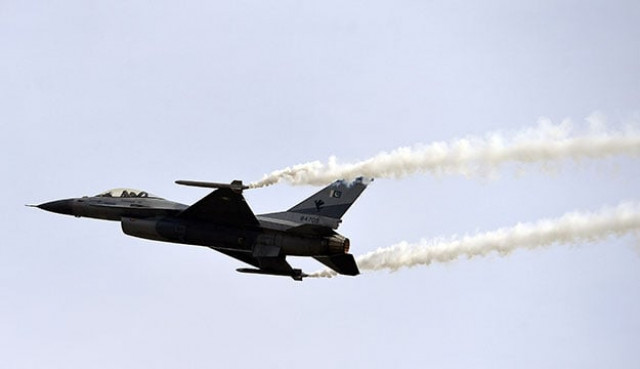Don't see end to military operation in near future, says PAF second-in-command
Pakistan wants air force upgrade for prolonged militant fight

The country is fighting a Taliban insurgency in its northwest, a separatist insurgency along its Iranian border in the west, and has a heavily militarised and disputed border with arch rival India in the east.
In 2014, the military launched a crackdown in North and South Waziristan and has managed to push back militants into a few pockets.
Arms transfer: US issues notification of F-16 sale to Pakistan
But its air force, which will need to retire dozens of jets over the coming years, lacks the latest technology and relies heavily on a fleet of about 70 US-made Lockheed Martin F-16s, which are solely capable of carrying out precision targeting.
"Our concern is that we don't know how long these anti-terrorist operations will continue," Pakistan Air Force second-in-command Muhammad Ashfaque Arain told Reuters in an interview late on Wednesday.
"We have weakened them (militants) to a great extent, but I don't see an end in the very near future, so all the burden is being shared by the F-16s and its pilots."
Skeptics suspect the country's military is seeking an improved arsenal to counter the growing military might of India, its eastern neighbour. The two countries have fought three wars since their violent separation in 1947 at the end of British colonial rule.
US senator does not expect Pakistan F-16 sale to be blocked
Pakistan's fleet also includes hundreds of Dassault Aviation French-made Mirage jets that are over 40 years old and F7 Chinese warplanes that are over 25 years old, both of which the air force plans to retire over the next few years.
To fill the void, Islamabad has decided to bet on the JF-17 fighter, jointly developed by China and Pakistan, rather than spending billions on fifth-generation multi-role aircraft like Dassault's Rafale, which rival India is buying, or the Russian Su-35.
That option, Arain said, had almost been ruled out for being too expensive and because Pakistan did not want to mix technologies and resources. It would only be reconsidered if "it was pushed against a wall".
Instead, 16 JF-17s will be produced this year with a further 20 in 2017, but Arain acknowledged that the jets' usefulness in current operations was limited because it lacks precision targeting.
Damocles pod
"Operationally, the aircraft are working pretty well so we if we had a targeting pod on the JF-17, the burden would be shared," Arain said.
He said his visit to Paris was in part aimed at assessing from French officials the prospects of supplying the Thales-made Damocles, a third-generation targeting pod. He said was Islamabad's priority for now.
Previous negotiations in 2010 for a deal worth 1.2 billion euros ($1.6 billion) worth of electronics and missiles collapsed under pressure from India, uncertainty over Pakistan's finances and fears of the transfer of technology given Chinese involvement in the JF-17.
Lockheed Martin ready to manufacture F-16 jets in India
"We're looking at the best option. The Damocles is a battle- proven system and the other options are not," Arain said. "If we do not get the Damocles pod for example, then we will need to look for alternate options that may not be proven."
He said that in the long run, the air force was thinking about its needs beyond 2030 when F-16s and JF-17s would start to be replaced.
The United States in February approved the sale to Pakistan of up to eight F-16 fighter jets for the short term, but Arain said even that was proving complicated.
"It's a much cheaper fighter jet, but buying more F-16s is economically not feasible for us and then there is a lot of human outcry," he said.
Arain countered any suggestion that Pakistan might want greater air power to target India by saying that New Delhi itself was expanding its fleet.
"We get eight aircraft and there are people who start to say that it will tilt the balance of power in South Asia. But when somebody across the border buys 36 aircraft and has plans to buy 126, that doesn't change the balance of power," he said, referring to India.



















COMMENTS
Comments are moderated and generally will be posted if they are on-topic and not abusive.
For more information, please see our Comments FAQ